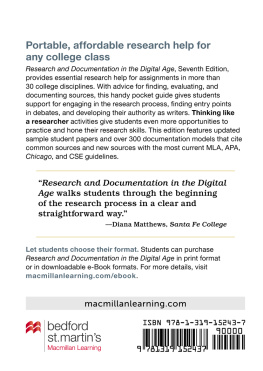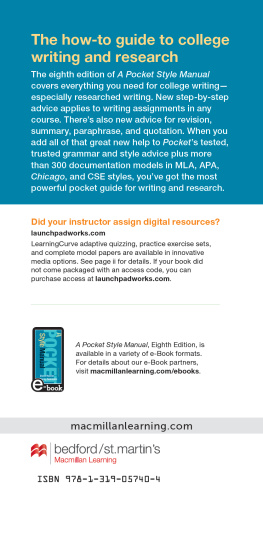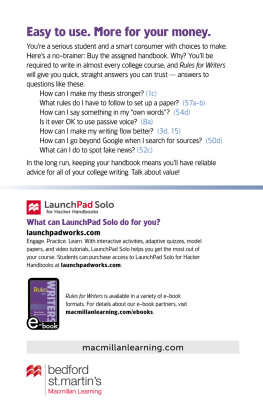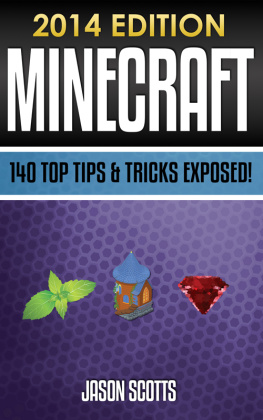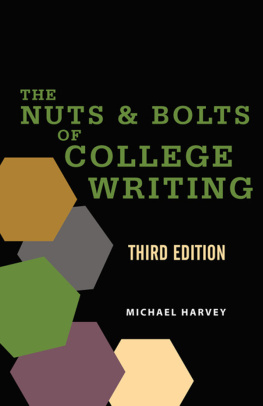Diana Hacker - A Pocket Style Manual, APA Version, Eighth Edition
Here you can read online Diana Hacker - A Pocket Style Manual, APA Version, Eighth Edition full text of the book (entire story) in english for free. Download pdf and epub, get meaning, cover and reviews about this ebook. year: 2020, publisher: MacMillan Learning, genre: Romance novel. Description of the work, (preface) as well as reviews are available. Best literature library LitArk.com created for fans of good reading and offers a wide selection of genres:
Romance novel
Science fiction
Adventure
Detective
Science
History
Home and family
Prose
Art
Politics
Computer
Non-fiction
Religion
Business
Children
Humor
Choose a favorite category and find really read worthwhile books. Enjoy immersion in the world of imagination, feel the emotions of the characters or learn something new for yourself, make an fascinating discovery.

- Book:A Pocket Style Manual, APA Version, Eighth Edition
- Author:
- Publisher:MacMillan Learning
- Genre:
- Year:2020
- Rating:3 / 5
- Favourites:Add to favourites
- Your mark:
- 60
- 1
- 2
- 3
- 4
- 5
A Pocket Style Manual, APA Version, Eighth Edition: summary, description and annotation
We offer to read an annotation, description, summary or preface (depends on what the author of the book "A Pocket Style Manual, APA Version, Eighth Edition" wrote himself). If you haven't found the necessary information about the book — write in the comments, we will try to find it.
A Pocket Style Manual, APA Version, Eighth Edition — read online for free the complete book (whole text) full work
Below is the text of the book, divided by pages. System saving the place of the last page read, allows you to conveniently read the book "A Pocket Style Manual, APA Version, Eighth Edition" online for free, without having to search again every time where you left off. Put a bookmark, and you can go to the page where you finished reading at any time.
Font size:
Interval:
Bookmark:
EIGHTH EDITION, APA VERSION
Faster and more reliable than a Google search, A Pocket Style Manual covers everything you need for college writing in APA style. You can turn to it for help with finding, evaluating, integrating, and citing sources as well as for advice on revising sentences for clarity, grammar, and punctuation. The following reference aids will help you find everything you need to be a successful college writer in any course.
- The brief and detailed contents inside the front and back covers allow you to quickly spot the help you need.
- The index at the back of the book includes plain-language entries like I vs. me to point to common problems like pronoun case.
- A wealth of resources for writing in APA style are provided, including models for in-text APA citations and reference list entries, as well as annotated sample pages from 11 student papers.
- The offer useful definitions and help with commonly confused or misused words such as affect and effect.
If your instructor has assigned a Hacker Handbooks media product, even more help is at your fingertips:
- Nearly 300 exercises help you improve your writing and effectively work with sources.
- 50 model papers in five documentation styles provide guidance in writing and formatting your work in any course.
- 33 LearningCurve quizzes offer gamelike sentence-level practice and let you track your progress.
For Bedford/St. Martins
Vice President, Editorial, Macmillan Learning Humanities: Edwin Hill
Executive Program Director for English: Leasa Burton
Executive Program Manager: Stacey Purviance
Marketing Manager: Vivian Garcia
Director of Content Development: Jane Knetzger
Senior Executive Editor for Handbooks: Michelle Clark
Development Editor: Will Stonefield
Senior Media Editor: Barbara G. Flanagan
Associate Editor: Melissa Rostek
Content Project Manager: Lidia MacDonald-Carr
Senior Workflow Project Supervisor: Joe Ford
Production Supervisor: Robin Besofsky
Senior Media Project Manager: Allison Hart
Manager of Publishing Services: Andrea Cava
Project Management: Lumina Datamatics, Inc.
Composition: Lumina Datamatics, Inc.
Photo Permissions Editor: Angela Boehler
Text Permissions Manager: Kalina Ingham
Director of Design, Content Management: Diana Blume
Cover Design: William Boardman
Copyright 2020, 2019, 2016, 2013 by Bedford/St. Martins.
All rights reserved. No part of this book may be reproduced, stored in a retrieval system, or transmitted in any form or by any means, electronic, mechanical, photocopying, recording, or otherwise, except as may be permitted by law or expressly permitted in writing by the Publisher.
For information, write: Bedford/St. Martins, 75 Arlington Street, Boston, MA 02116
ISBN 978-1-319-37045-9
Acknowledgments and copyrights appear on the same page as the text and art selections they cover; these acknowledgments and copyrights constitute an extension of the copyright page.
In most of your college courses, its likely you will be asked to complete one or more writing assignments. Besides composition courses, a wide variety of college courses require writing. Many different types of writing essays, laboratory reports, memos, and treatment plans, for example are assigned in many types of courses, such as psychology, sociology, business, and nursing. Instructors in these courses typically ask their students to write in the style recommended by the American Psychological Association (APA).
APA style is a set of rules and guidelines for writers in the social sciences (psychology, sociology, criminal justice, anthropology, political science) and in business, education, and nursing. When you are assigned a paper for a particular class, you should think of that assignment as an opportunity to join a discourse community a group of thinkers and writers in a field who share interests, ideas, and ways of communicating with one another. When you adhere to APA style, you satisfy your readers expectations and allow them to focus attention on the substance of your writing without unnecessary distractions.
APA style may be used for many types of writing, or genres. The following are the most common types of papers assigned in courses in which APA style is required:
- research paper: literature review
- research paper: original empirical research
- laboratory report
- analytical essay
- annotated bibliography
- administrative report
- case study
- clinical paper
- professional memo
- reflective essay
- social issue paper
contains excerpts from several papers written in APA style.
The ideas, theories, and findings of scholars published in academic journals or books contribute to what researchers call the literature on a topic.
A common research assignment in undergraduate classes is a literature review. When you write a literature review, you formulate a research question and collect sources that have been written about your question. You summarize and synthesize the sources, indicating how they relate to one another and what insights they contribute to your question. You can also suggest ways that future research might add clarity to the conversation.
For instance, suppose you settled on the research question What is the relationship between poverty rates and property crime rates in urban communities? In answering this question, you might compare data from the U.S. Census Bureau about the incidence of poverty in a particular group of cities and data from the Uniform Crime Reports about the incidence of property crime in those cities to see if a statistically significant relationship exists.
A review of the literature may be incorporated in other types of papers, especially empirical research papers and laboratory.)
An empirical research paper is a report on an original study that you design and data that you collect, perhaps from interviews, experiments, surveys, or observations in the field. Such data are called primary data. A research paper may also include secondary data results from studies by other researchers that are relevant to the design of your study and the analysis of your data.
In an empirical research paper, you state a research question or a hypothesis, briefly describe the work of others on the topic, present the methods you used to collect your data, analyze the data you collected, summarize important findings, analyze others data in light of your own, and draw conclusions.
For example, to investigate the extent of and attitudes toward cheating on your campus, you might design a survey to give to students and then follow up the survey with one-on-one interviews. The data you collect from the survey and the interviews are your primary data. You would also briefly describe other researchers work on the topic, giving an overview of the literature before presenting your own procedures and results. And you would use previous findings in your analysis of cheating on your campus.
In the social sciences, a laboratory report provides details of an experiment or a study that you have conducted, usually with human participants in a controlled setting. For example, you might conduct an experiment in a psychology class to investigate how people respond to stress in competitive situations. Your lab report would include the main elements found in an empirical is typically fewer than 10 pages.
Font size:
Interval:
Bookmark:
Similar books «A Pocket Style Manual, APA Version, Eighth Edition»
Look at similar books to A Pocket Style Manual, APA Version, Eighth Edition. We have selected literature similar in name and meaning in the hope of providing readers with more options to find new, interesting, not yet read works.
Discussion, reviews of the book A Pocket Style Manual, APA Version, Eighth Edition and just readers' own opinions. Leave your comments, write what you think about the work, its meaning or the main characters. Specify what exactly you liked and what you didn't like, and why you think so.

